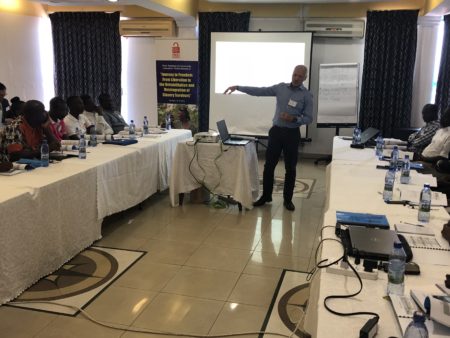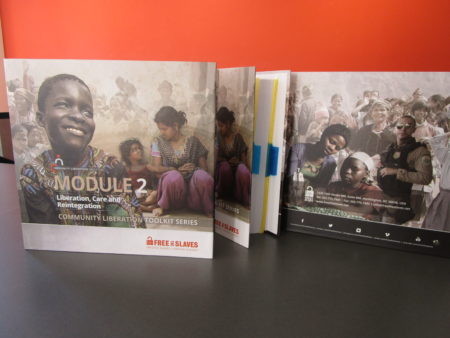Field testing is underway for our latest training initiative. A Free the Slaves team this month debuted our new handbook on the liberation, rehabilitation and reintegration of people who’ve been trapped in modern slavery.
The first five-day beta test workshop was conducted in Ghana. More than 20 front-line field workers from International Justice Mission (IJM), Afrikids, the Don Bosco Child Protection Center, International Needs Ghana (INGH), Challenging Heights, Partners in Community Development Program (PACODEP), Friends of the Nation and the International Cocoa Initiative came together to learn the latest research and techniques in bringing people from slavery to freedom.
The curriculum includes training on victim identification, working with police, liberation techniques, legal assistance and psychosocial care, vocational training and repatriation.
Participants welcomed the comprehensive approach:
“The Free the Slaves community based strategy is really very helpful to my work,” said IJM Aftercare Case Management Manager Daniel Kotei. “Knowing how to work with the community is very important, especially when trying to help a client holistically and completely.”
“There were things that we were not doing it right,” said PACODEP Junior Program Coordinator Goerge Achibra.” This was an eye opener. This has really built our capacity.”
“I learned a lot,” said Don Bosco Deputy Director Francis Adzraku. “This strategy is holistic. I think the community based approach is the root.”
“The training that I have received from Free the Slaves will help me get proper counseling and medical rehabilitative services for the children,” said INGH Project Manager Cynthia Ardey. “I am very satisfied.”

The training module on liberation, care and reintegration is the second manual of a four-volume set. The overall goal is to integrate anti-trafficking activities into all international development programs. That will help those programs reach people currently blocked by traffickers from participating — while ending slavery at the same time.
Workshop participants agreed that ending slavery will aid international development:
“Slavery does not allow anybody to develop, so that once people are free from slavery, you know that they are on the path to effective development,” said Adzraku.
“Freedom from slavery helps the individual live their life without fear and be able to meet their needs,” said Kotei. “I would recommend that every organization integrate anti-human trafficking activities into their project.”
“Freedom from slavery brings positive things to the individual and the community,” said Ardey. “Children who are freed have the opportunity to empower themselves, go to school, learn a skill and become responsible adults to help in the development of the community.”
“Every child who is rescued is an ambassador to the community,” noted Achibra.

A second field test will occur next month in Haiti. Free the Slaves Haiti Director Smith Maximé was on hand in Ghana to see how the first workshop unfolded.
“This training provides the standard for where we should be in terms of liberation, care, and reintegration. It has given us an opportunity to see what we are doing in the field and to compare it to the standard,” Maximé said.
Learn more about our Community Liberation Initiative training toolkit modules here.
Editor’s Note: Thanks to the Ghana workshop team for their help with this story: Joha Braimah, Bismark Quartey, Kavi Ramburn, John Whan Yoon, Ralph Simpson.



